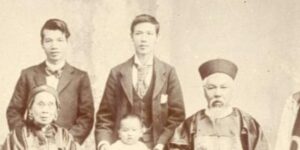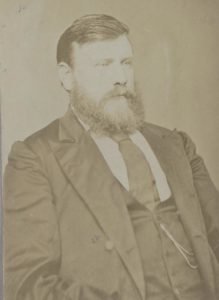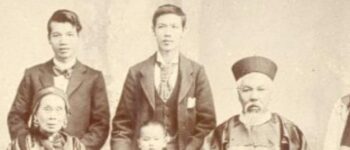1900: The Opium Petition
September 14, 2021
By AHNZ
 Today in history, 13 September, 1900, a Chinese West Coaster submitted a petition that led to the Liberal Government’s clamping down on opium and the Chinese (“yellow peril”) in general.
Today in history, 13 September, 1900, a Chinese West Coaster submitted a petition that led to the Liberal Government’s clamping down on opium and the Chinese (“yellow peril”) in general.
State history would have it that this noble young Greymouth law clerk, Young Hee, cared so much about his people that he wanted the scourge of opium lifted from their lives. That he wrote to Richard Seddon’s government to put things right.
[image ref. above, The Young family men, left to right: Hee, Saye, and their father John]
“The campaign against opium smoking was initiated and driven by the Chinese community. However, while the petition stated that opium addiction was a problem for Chinese and non-Chinese alike, the subsequent Act targeted and discriminated against the Chinese. No permits for importing opium could be given to the Chinese, and police were able to enter premises occupied by Chinese on suspicion of possessing opium without a search warrant – which was not repealed until 1965.”- Opium Petition, Archives New Zealand; Flickr
I can’t believe the Chinese migrant community or the 541 people who signed this petition ever wanted to set up Seddon’s Liberal government for what was about to be done to them. But I do believe Seddon did.
 My opinion is that Seddon’s Ministry wanted to clamp down on Chinese and to have control of the drugs trade and needed a pretense. Reform would sound better coming from the Chinese community so, I think, they enlisted Young Hee to provide that pretense by creating this petition.
My opinion is that Seddon’s Ministry wanted to clamp down on Chinese and to have control of the drugs trade and needed a pretense. Reform would sound better coming from the Chinese community so, I think, they enlisted Young Hee to provide that pretense by creating this petition.
The Greymouth law firm Young Hee worked for was none other than ‘Hannan & Seddon’. At the time the firm was just ‘Hannan’ because Richard Seddon’s son had yet to become partner but the political connection is there1.
Young Hee left New Zealand soon after, going back to China with his father John. He left behind a country he had helped turn against his own people but that wouldn’t bother him as he made his exit. By this time, Young Hee’s Chinese wife was dead (perhaps her foot-binding lowered her life expectancy?) and he departed with his new Western wife for a life of business in Hong Kong. Perhaps his political patrons helped set him up in exchange for his selling out his people?
Note: This was not the start of the attack on the Chinese New Zealanders. That was well underway
Note: Brother Saye remained in New Zealand and was issued the first known New Zealand passports so that he could travel to Hong Kong to see the family and return.
“The passport is thought to be the first issued in New Zealand. The Department of Internal Affairs says it is the oldest one it holds. Passports came into use about the time Young Saye decided to travel abroad. Before that, people could enter and leave the country more freely.” – Reviving the early days on the West Coast, Stuff (2009)
“I was surprised to learn that some of the female migrants who came to the West Coast had bound feet, including Hui Young Hee, the wife of a popular Greymouth law clerk. Others, like ‘former bondsgirl’ Annie Long of Ahaura and the fiercely independent Lily Chow Fong, did not suffer this impediment, enjoyed greater mobility and forged strong local Chinese and European networks. By contrast, the road traveled by the Pakeha women who married Chinese men was a very hard one. Bradshaw provides glimpses into the lives of individuals such as Mary Ford, who caused great scandal in Greymouth when she chose to follow Young Hee to Hong Kong to become his second wife, …” – Fraser (2010)
Note: Stuff reported in 2009 that researcher Julia Bradshaw had found that this first known passport dates from 1915. Local papers frequently bungle basic facts, especially when it comes to history. So, it’s probably more correct to go with Archives New Zealand who state that it was really 2 May 19023.
The petition led to the Opium Prohibition Act (1901) which was New Zealand’s first prohibition on drugs. No more could opium be imported in a form suitable for smoking (the form enjoyed by the Chinese who wished to chill out after a hard day’s work.) New Zealand Police were also empowered by the Act to search any Chinese premises they liked without warrant.
“If any constable has reasonable cause to suspect that the smoking of opium is going on or is permitted in any house or premises, he may, under a search warrant, enter and search such house or premises, and seize and carry away any opium, and appliances for the smoking of opium, found therein: Provided that a search warrant shall not be required in the case of any entry on premises occupied by Chinese.” – Section 8, Opium Prohibition Act 1901
No wonder the Young family, who had facilitated this persecution, fled New Zealand. I hope they at least got a good price for it from Seddon. Thirty pieces of silver is the usual fee…
—
1 “The name Seddon comes from Mr T E Y Seddon (son of Premier Richard John Seddon from Kumara) who joined the firm in the 1920’s” Ref. nzlaw.co.nz; Wayback Machine
3 Ref. From: Governor, Wellington Date: 2 May 1902 Subject: Passport in favour of Young Saye to enable him to travel in foreign ports (R24919007); Archway, Archives New Zealand
Image ref. Young family; Shantytown, Facebook (2009)
Ref. The Chinese Miners, beezneez (2014)
Ref. Review of Golden Prospects: Chinese on the West Coast of New Zealand, Julia Bradshaw, Shantytown (West Coast Historical & Mechanical Society) (2009) by Lyndon Fraser, New Zealand Journal of History (2010); nzjh.auckland.ac.nz
Ref. Young’s petition, Lyttleton Times; Papers Past
Ref. Opium Prohibition Act 1901, New Zealand Acts As Enacted, New Zealand Legal Information Institute
2 thoughts on "1900: The Opium Petition"
Leave a Reply
 Like Comment Share
Like Comment Share






Tom Seddon became an MP on the death of his father in 1906. He enlisted, as an MP, during WW1 and went to war in France with NZEF. He lost an election in 1922, and worked as a lawyer in Greymouth. He won the 1925 election, then lost again in 1928. Then he and family moved to Wellington and he became Chair of the War Pensions Board.
David Verrall
Honorary Ambassador for Westland (in the guise of Richard John Seddon).
Also the center of the 1905 ‘Voucher Incident’ which I may write about soon. Thank you very much Mr Verrall plenipotentiary!